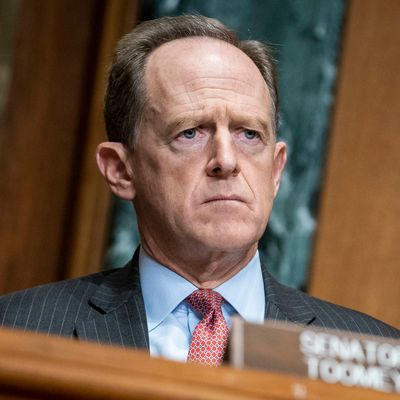
For those who favor speedy enactment of COVID-19 stimulus legislation, it’s encouraging that long-stalled bipartisan talks are reportedly close to fruition as the this Congress comes to an end. But bringing a largely uninterested congressional Republican Party to the brink of a deal has come with a big price for the most hard-pressed Americans and for the economy as a whole: the ancient and resurgent conservative gospel of austerity.
For months we have heard that Senate Republicans were reluctant to approve any stimulus legislation on grounds that the $2.2 trillion CARES Act enacted last March was sufficient, or that the economy is doing just fine without further assistance, or that “future generations” couldn’t afford to retire the debt being incurred to pay for such assistance at a time with federal revenues are down. In August, after Mitch McConnell unveiled a $1 trillion stimulus proposal, the HEALS Act, with a price tag more than 70 percent lower than the Heroes Act passed by Democrats in the House, Politico estimated that half of the Republican Senate conference wouldn’t support it because it was too generous.
And sure enough, McConnell later began developing a series of “skinny stimulus” proposals in order to get his troops behind something other than letting people die or starve. Senators such as Ben Sasse, Ron Johnson, Ted Cruz, Rand Paul and Marsha Blackburn were especially outspoken about stimulus spending boosting deficits and debt – not a concern Republicans have been terribly focused on during a Trump presidency that has conspicuously spilled a lot of red ink.
This renewed deficit hawk talk didn’t make a great deal of electoral sense, particularly since it contradicted the pro-stimulus position of the president some of them revered, as Bloomberg News’s Steven Dennis observed:
The revival of deficit complaints from lawmakers like Cruz and Ron Johnson of Wisconsin arguably couldn’t be coming at a worse time for the GOP.
Trump’s approval rating has dropped and independent election analysts are now giving better odds of Democrats taking the Senate and expanding their control of the House in the November election. Now Republicans are proposing to trim aid that was in the last stimulus for tens of millions Americans who have lost their jobs amid a recession despite warnings from economists that the country needs another fiscal jolt.
Now that the election is over, and despite rising coronavirus cases and a slowing economy, the GOP’s fiscal hawks are preparing to go back to the austerity message so many of them deployed during the Obama administration. As a result, the emerging stimulus deal is a lot “skinnier” than one many Republicans – including Donald Trump – might have supported before November 3, notes The Hill: “McConnell is getting a deal a lot closer to what Democrats dismissed as the ‘emaciated” plan he pushed in recent months than the $2.2 trillion HEROES Act that Pelosi and Schumer said should have been the ‘starting point’ of the talks.”
Beyond the shape and scale of the stimulus deal, which will largely exclude state and local government assistance, and will offer only scaled-down unemployment insurance supplements and smaller direct stimulus checks, there’s a new austerity push from Senate Republicans that is aimed at restraining the monetary policy tools available to the Biden administration. It’s a late-breaking demand in the stimulus talks, with Pennsylvania senator Pat Toomey taking the lead for the green eyeshade faction of the GOP, as NBC News’s Sahil Kapur reports:
[L]eaders had hit a new roadblock as Democrats on Friday accused Republicans, led by Sen. Pat Toomey, R-Pa., of seeking to hamstring the incoming Biden administration by cutting off Federal Reserve emergency lending facilities created by the CARES Act to protect the fragile economy.
Democrats want to extend that authority into the new year, describing it as an important tool to respond to an economic crisis….
Toomey called the issue his “top priority” in a phone call with reporters, arguing that the Fed lending programs were designed to be “temporary” and “cease operations no later than the end of 2020.”
Which happens, of course, to be the end of a Republican administration and the beginning of its Democratic successor. So far McConnell has made Toomey’s demand his party’s own.
It’s unclear how the negotiations will turn out as talks drag on into the weekend before Christmas. But it is very clear that Republicans are going back to their old austerity hymnbook, with half-forgotten pleas to fiscal probity and monetary restraint. Any day now, we will hear the first heartfelt cries of warning about inflation that we have heard in years, along with all sorts of moralizing about a federal government that cannot live within its means.
This will only get worse when Joe Biden inherits a whole world of hurt on January 20.






























